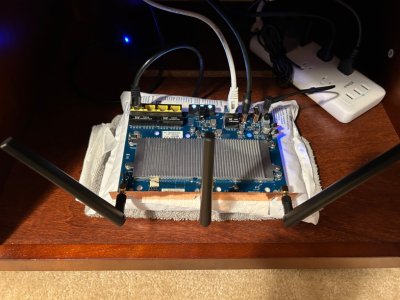This left me scratching my head and I cant seem to figure out why colder is not better.
As a fun project I removed the PCB board from its enclosure on an ASUS AC68U router, over clocked the CPU to 1,200Ghz and kept ram at 666Mhz. Ambient temp is around 75F / 23C degrees and routers CPU is hovering at around 167F / 75C.
Overclocking CPU did improve performance, when copying files to an external hard drive that is attached to the AC68 router by 5MB/s, from an average of 18MB/s to an average of 23MB/s, Its not much but still a great improvement.
So I decided to take it a step further and cool down the entire PCB and the CPU. I have reusable thermal packs, so I placed the PCB on top of it flat, waited about 10 minutes and CPU temp dropped to 86F / 30C. Performed another transfer test of the same large file that is about 10GB, and the speeds plummeted down to 4MB/s, few seconds later it would shoot up to 20MB/s and drop to 10MB/s. The speeds were inconsistent the entire time while the routers CPU temp was hovering at around 31C / 88F degrees. I performed the test several times just to be sure it's not a fluke and results were still just as poor.
Once I removed the thermal pack and let the CPU reach temps above 104F / 40C, the transfer speeds were better, but still not as consistent when CPU was at around 167F / 75C.
Ive overclocked CPUs on computers for many years, I’ve seen many results when people use liquid nitrogen to cooldown an overclocked CPU and GPU on computers and yet none of them had such significant adverse effects when it comes to a CPU performing calculations or benchmarks.
I know there are people who are a lot smarter than me and perhaps one of you can provide some insight as to why I’m seeing less performance from a CPU on a wifi router, that is cooldown to only 31C / 88F degrees.
As a fun project I removed the PCB board from its enclosure on an ASUS AC68U router, over clocked the CPU to 1,200Ghz and kept ram at 666Mhz. Ambient temp is around 75F / 23C degrees and routers CPU is hovering at around 167F / 75C.
Overclocking CPU did improve performance, when copying files to an external hard drive that is attached to the AC68 router by 5MB/s, from an average of 18MB/s to an average of 23MB/s, Its not much but still a great improvement.
So I decided to take it a step further and cool down the entire PCB and the CPU. I have reusable thermal packs, so I placed the PCB on top of it flat, waited about 10 minutes and CPU temp dropped to 86F / 30C. Performed another transfer test of the same large file that is about 10GB, and the speeds plummeted down to 4MB/s, few seconds later it would shoot up to 20MB/s and drop to 10MB/s. The speeds were inconsistent the entire time while the routers CPU temp was hovering at around 31C / 88F degrees. I performed the test several times just to be sure it's not a fluke and results were still just as poor.
Once I removed the thermal pack and let the CPU reach temps above 104F / 40C, the transfer speeds were better, but still not as consistent when CPU was at around 167F / 75C.
Ive overclocked CPUs on computers for many years, I’ve seen many results when people use liquid nitrogen to cooldown an overclocked CPU and GPU on computers and yet none of them had such significant adverse effects when it comes to a CPU performing calculations or benchmarks.
I know there are people who are a lot smarter than me and perhaps one of you can provide some insight as to why I’m seeing less performance from a CPU on a wifi router, that is cooldown to only 31C / 88F degrees.
Attachments
Last edited:


